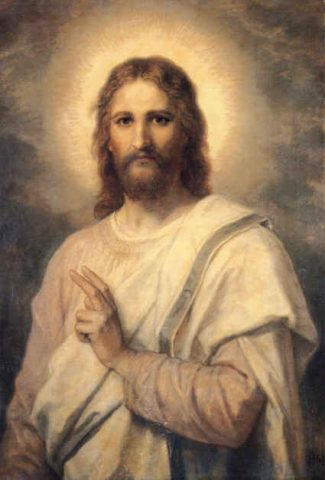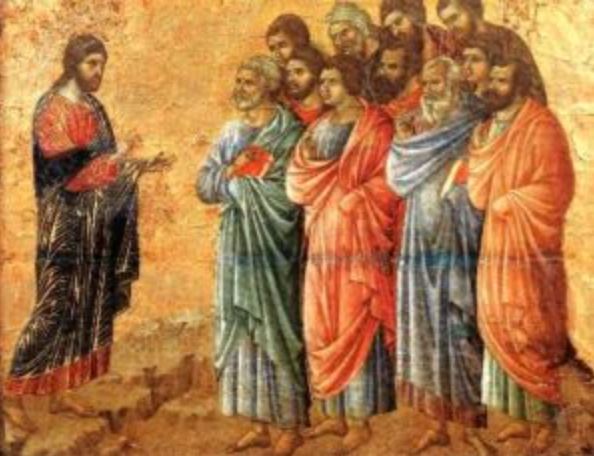GOSPEL READING: Matthew 7:21,24-27
21 “Not every one who says to me, `Lord, Lord,’ shall enter the kingdom of heaven, but he who does the will of my Father who is in heaven. 24 “Every one then who hears these words of mine and does them will be like a wise man who built his house upon the rock; 25 and the rain fell, and the floods came, and the winds blew and beat upon that house, but it did not fall, because it had been founded on the rock. 26 And every one who hears these words of mine and does not do them will be like a foolish man who built his house upon the sand; 27 and the rain fell, and the floods came, and the winds blew and beat against that house, and it fell; and great was the fall of it.”
SCRIPTURE READING: Isaiah 26:1-6
1 In that day this song will be sung in the land of Judah: “We have a strong city; he sets up salvation as walls and bulwarks. 2 Open the gates, that the righteous nation which keeps faith may enter in. 3 You keep him in perfect peace, whose mind is stayed on you, because he trusts in you. 4 Trust in the LORD for ever, for the LORD GOD is an everlasting rock. 5 For he has brought low the inhabitants of the height, the lofty city. He lays it low, lays it low to the ground, casts it to the dust. 6 The foot tramples it, the feet of the poor, the steps of the needy.”
Meditation: What’s the best security against disaster and destruction? In the ancient world a strong city, an impregnable fortress, and a secure house were built on solid rock because they could withstand the forces of nature and foe alike. Isaiah speaks of God as an “everlasting rock” (Isaiah 26:4). He is the rock of refuge and deliverance (Psalm 18:2) and the rock in whom there is no wrong (Psalm 92:15). Scripture warns that destruction will surely come to those who place their security in something other than God and his kingdom. Jesus’ parables invite us to stake our lives on the coming of his kingdom or face the consequences of being unprepared when the day of testing and destruction will surely come.
The only foundation that can keep us safe
When Jesus told the story of the builders he likely had the following proverb in mind: “When the storm has swept by, the wicked are gone, but the righteous stand firm for ever”(Proverbs 10:25). What’s the significance of the story for us? The kind of foundation we build our lives upon will determine whether we can survive the storms that are sure to come. Builders usually lay their foundations when the weather and soil conditions are at their best. It takes foresight to know how a foundation will stand up against adverse conditions. Building a house on a flood plain, such as a dry river-bed, is a sure bet for disaster! Jesus prefaced his story with a warning: We may fool humans with our speech, but God cannot be deceived. He sees the heart as it truly is – with its motives, intentions, desires, and choices (Psalm 139:2).
There is only one way in which a person’s sincerity can be proved, and that is by one’s practice. Fine words can never replace good deeds. Our character is revealed in the choices we make, especially when we are tested. Do you cheat on an exam or on your income taxes, especially when it will cost you? Do you lie, or cover-up, when disclosing the truth will cause you injury or embarrassment? A true person is honest and reliable before God, one’s neighbor and oneself. Such a person’s word can be taken as trustworthy.
Christ is the only rock that can save us
What can keep us from falsehood and spiritual disaster? If we make the Lord Jesus and his word the rock and foundation of our lives, then nothing can shake us nor keep us from God’s presence and protection. Is the Lord Jesus and his word the one sure foundation of your life?
Lord Jesus, you are the only foundation that can hold us up when trials and disaster threaten us. Give me the wisdom, foresight, and strength of character I need to do what is right and good and to reject whatever is false and contrary to your will. May I be a doer of your word and not a hearer only.
Psalm 118:1, 8-9, 19-21, 25-27
1 O give thanks to the LORD, for he is good; his steadfast love endures for ever!
8 It is better to take refuge in the LORD than to put confidence in man.
9 It is better to take refuge in the LORD than to put confidence in princes.
19 Open to me the gates of righteousness, that I may enter through them and give thanks to the LORD.
20 This is the gate of the LORD; the righteous shall enter through it.
21 I thank you that you have answered me and have become my salvation.
25 Save us, we beseech you, O LORD! O LORD, we beseech you, give us success!
26 Blessed be he who enters in the name of the LORD! We bless you from the house of the LORD.
27 The LORD is God, and he has given us light. Bind the festal procession with branches, up to the horns of the altar!
Daily Quote from the Early Church Fathers: Turn your vision to the Savior, by Verecundus (died 552 AD)
“When Hezekiah, the king of Judah and son of Ahaz, was gravely ill and had learned of his coming death by the prophecy of Isaiah, he turned his face to the wall and wept bitterly (2 Kings 20:1-3). Immediately the Lord in his mercy not only averted the destruction of imminent death but also added fifteen years to the man’s life. Then, at last, Hezekiah sang this song (Isaiah 38:10-20). Hezekiah, a holy man who reigned at that time over all of Israel, displayed the Lord’s form: clearly he had every movement of body, soul and mind in subjection to himself, and he accepted the consequences of his infirmity and weakness. He knew without doubt through the prophetic message that the end of his life was approaching. For the longer we seem to live, the more indubitably is our future death foreknown to us. And if we turn our face to the wall when struck by the fear of death, that is, if we direct the vision of our hearts to the Savior, who is here represented by the wall because he is elsewhere called ‘a wall,’ we will be saved, inasmuch as he saves the faithful who dwell within him from a great many attacks. ‘In the city of our strength,’ says Isaiah, ‘is the Savior established as a wall and a fortress’ (Isaiah 26:1). Behold, the Savior is said to be a wall.” (excerpt from COMMENTARY ON THE CANTICLE OF EZEKIEL 5.1-2)
[Verecundus was an African Christian writer and bishop in the 6th century AD.]







